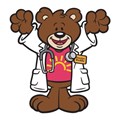Story
Meet super adorable miss Halle Ching, the only patient in the worldwide Human Gene Mutation Database with her particular DNA change, identified as a mutation in a calcium channel gene called CACNA1C. It took almost eight years before doctors were able to provide a definitive diagnosis of what caused Halle’s severe disabilities. Now that there’s a more specific diagnosis, however, it hasn’t provided much relief to Halle’s parents, Cathy “Cat” Stevens and Erik Ching.
“At some point, you start to think they may never know what she has. But then it stopped mattering as much,” Stevens says.
Halle was born five weeks early on February 3, 2010. Besides her low birth weight and a fever, all things seemed normal. Once Halle’s fever subsided, she was able to go home. It wasn’t until her nine-week check-up that her pediatrician noticed Halle had poor eye contact, head control, and body stiffness - signaling she may have been experiencing seizures. Following an EEG with a neurologist, Stevens and Ching received a heartbreaking phone call about Halle’s results.
“They called us the day of the EEG and said things like ‘Halle’s going to need support her entire life,’ and ‘She might not walk or talk, and might not even be able to sit up,’ ” Stevens says.
Initially diagnosed with mitochondrial disease, Halle has endured more than 30 EEGs, painful spinal taps, MRIs, and countless genetic tests before the CACNA1C gene discovery was made in 2018. Today, she has serious developmental delays as well as issues with vision, hearing, speaking, walking, and poor muscle tone that affect her overall ability to function, and uses a feeding tube. Halle sees a variety of Prisma Health Children’s Hospital–Upstate doctors, has standing physical, occupational and speech therapy appointments, and fortunately, has had significant improvements in the frequency of seizures with medication.
Caring for a medically complex child takes on a life all its own. Halle receives around-the-clock care from family and Medicaid in-home care staff that assists for 21-hours a week. Cat, Erik, and their other two sons, Anders and Evan, say that despite the day-to-day challenges they face along with Halle, they are overwhelmed with love and admiration for Halle and the strength they find through her.
- Epilepsy including treatment with medications, ketogenic diet, vagal nerve stimulator, and surgical evaluations
- Pediatric headache including migraine
- Neuromuscular disorders including at the multidisciplinary Muscular Dystrophy Association clinic
- Developmental delay
- Movement Disorders including Tourette’s Syndrome
- Genetic disorders such as Rett syndrome
- Cerebral palsy
Support Pediatric Neurology with a donation!
Donations made to Pediatric Neurology through this year's Radiothon will help purchase Magna Doodles, among other items. Magna Doodles don't just let children play; by playing with them kids are also working on their fine motor skills.
Need another way to give? You can use our text-to-give option!
Simply text HALLE to 41444, then follow the link in the reply to access the donation form.
